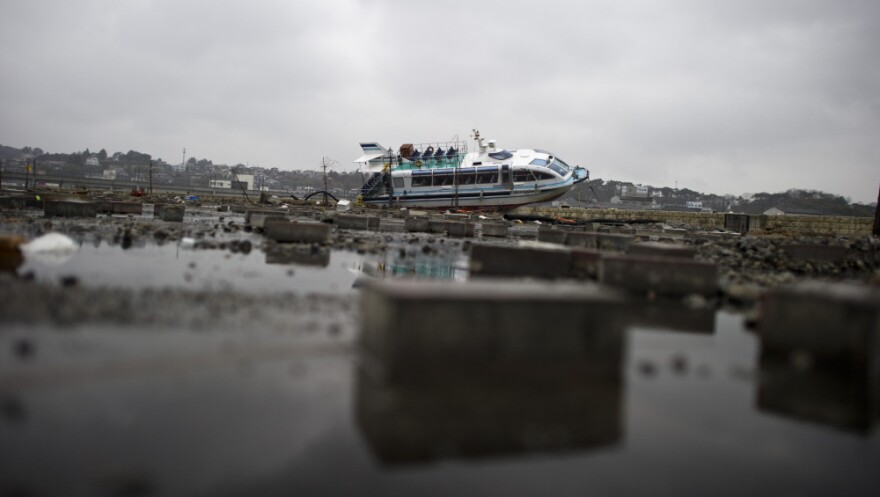The word "tsunami" is originally a Japanese word, but today it's commonly used in English. And it's been all over the news since a powerful earthquake sent a wall of water into northeastern Japan on March 11.
The first English use of the word happened more than 100 years ago, says linguist Ben Zimmer, of the Visual Thesaurus. That's when an earthquake struck off the east coast of Japan, very close to where the recent tsunami hit.
"There was reporting in the National Geographic Magazine, and it said, 'On the evening of June 15, 1896, the northeast coast of Hondo, the main island of Japan, was struck by a great earthquake wave,' " Zimmer says, "and then it explained that the Japanese term for this was 'tsunami.' "
From that first mention, the term became more widespread — especially after the disaster that devastated Indonesia in 2004.
A Question Of Accuracy
Zimmer suggests that perhaps "tsunami" spread in use because the common synonym, "tidal wave," is inaccurate — waves from underwater earthquakes have nothing to do with tides.
Then again, "tsunami" isn't technically accurate either. Just ask professor Robert Ramsey, chairman of the department of East Asian Languages and Cultures at the University of Maryland.
"The normal etymology of that word is tsu plus nami, " he says, "which is 'harbor' plus 'wave.' But you know, these things don't just occur in harbors."
Ramsey also points out that the words we borrow from Japanese are usually cultural ones, such as futon, sushi, karaoke, manga or anime.
Those words all refer to things that are very specific to Japan. But tsunamis are more general — they can happen anywhere in the world.
We've brought it over into English anyway, changing the pronunciation a bit, by dropping the T-S sound from the Japanese "TSU-nami," and just pronouncing it as "SU-nami."
Japan's Long Tsunami History
It is fitting that the global word for this natural disaster is the word the Japanese people use: Tsunamis happen frequently in Japan. Almost one-third of all recorded large tsunamis happened in that country.
Drawing on the meticulous record-keeping of Japanese officials, the National Oceanic and Atmospheric Administration has a website that lists tsunamis in Japan going back to the year 684.
And that long history is reflected in Japan's cultural work, says Susan Napier, professor of Japanese studies at Tufts University.
"There is this very intense relationship that the Japanese have with the sea," Napier says. "They're an island country; fish is the main staple of their diet; all the great woodblock print artists have many, many pictures of the ocean."
Napier says that in early Japanese literature, disaster narratives are focused on earthquakes and fire — perhaps because many pre-modern literary figures lived in Kyoto, far from the coast.
In modern times, though, many major cultural figures have created works about tsunamis. Napier mentions Nobel Prize winner Kenzaburō Ōe.
"He wrote a book called Kōzui wa waga tamashii ni oyobi — 'the floodwaters have come into my soul,' " she says. "It's about a group of young anarchists, and they dream that the world will eventually be destroyed by nuclear energy, and then a wave will rise."
Napier also mentions animator Hayao Miyazaki's 2007 film Ponyo,which tells the story of a sea rising up and submerging an entire town.
"There is a kind of melancholy in Japanese culture," she says. "There's a term for it called mono no aware, which means 'the sadness of things.' It's basically how you feel on a spring day when you see the cherry blossoms, and you know that any minute, a wind is going to come up and blow them away."
Napier says that the idea that "the creations of human beings actually do go into dust, or into the waves, actually makes life more beautiful and more profound. It's a very deeply rooted part of Japanese culture."
A Word For A Tragedy
In this discussion of the technicalities and origin of the word "tsunami," Robert Ramsey notes that the realities of what is now happening in Japan are not being lost.
Two of his department's former students were in Sendai, he says; so were a colleague's relatives. They're all accounted for — but the department is shaken.
"I don't know how I'm going to teach my class — we're totally devastated. We're as concerned as I guess the world is right now."
Copyright 2021 NPR. To see more, visit https://www.npr.org.



